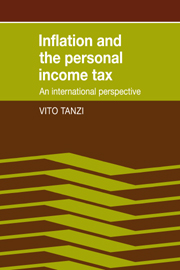Book contents
- Frontmatter
- Contents
- Preface
- 1 Inflation and personal income taxation: an introduction to the main issues
- 2 Inflation and the real progression of the rates: problems and solutions
- 3 Inflation and the real progression of the rates: countries' experiences
- 4 Inflation and the taxation of capital gains: problems and solutions
- 5 Inflation and the taxation of interest income: problems and solutions
- 6 Inflation and the taxation of business incomes
- 7 Inflation, lags in collection, and the real value of income tax revenue
- 8 Sensitivity of personal income tax yield to income changes: theory and measurement
- 9 Indexing the personal income tax for inflation and real growth
- 10 Inflation, income taxes, and the equilibrium rate of interest: theory
- 11 Inflation, income taxes, and interest rates: some empirical results
- 12 Inflation, indexation, and the wage-tax spiral
- 13 Some general conclusions on indexation
- Notes
- Index
10 - Inflation, income taxes, and the equilibrium rate of interest: theory
Published online by Cambridge University Press: 07 October 2011
- Frontmatter
- Contents
- Preface
- 1 Inflation and personal income taxation: an introduction to the main issues
- 2 Inflation and the real progression of the rates: problems and solutions
- 3 Inflation and the real progression of the rates: countries' experiences
- 4 Inflation and the taxation of capital gains: problems and solutions
- 5 Inflation and the taxation of interest income: problems and solutions
- 6 Inflation and the taxation of business incomes
- 7 Inflation, lags in collection, and the real value of income tax revenue
- 8 Sensitivity of personal income tax yield to income changes: theory and measurement
- 9 Indexing the personal income tax for inflation and real growth
- 10 Inflation, income taxes, and the equilibrium rate of interest: theory
- 11 Inflation, income taxes, and interest rates: some empirical results
- 12 Inflation, indexation, and the wage-tax spiral
- 13 Some general conclusions on indexation
- Notes
- Index
Summary
The inflationary conditions that have prevailed in the industrialized countries in recent years have made investigators aware of the likely relationship between the rate of inflation and the nominal rate of interest. Of the various theories that may bear on this relationship, Fisher's is the one that has attracted most attention. The Fisherian relationship has been analyzed in several recent studies, some of which have subjected it to empirical tests.
In most of these studies, Fisher's theory has been taken at its face value: In testing its empirical validity, researchers have generally ignored important economic and institutional changes since Fisher first proposed his theory. In particular, up to 1975, no attention had been paid to the existence and importance of income taxes, and to the effects that these may have on Fisher's theoretical conclusions, which were formulated and proposed in the United States at a time when the country did not have an income tax.
In a discussion of the interrelationship between income taxes and interest rates under inflationary conditions, one can either pursue an expost analysis emphasizing the inequities and/or distortions associated with taxing the whole nominal income from interest, instead of its real component; or pursue an ex ante, or equilibrium, analysis by discussing the possibility that the existence of income taxes should lead, in the absence of fiscal illusion, to adjustments in the nominal rate of interest.
- Type
- Chapter
- Information
- Inflation and the Personal Income TaxAn International Perspective, pp. 107 - 117Publisher: Cambridge University PressPrint publication year: 1980



